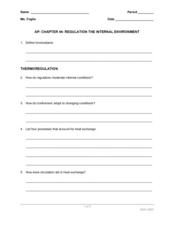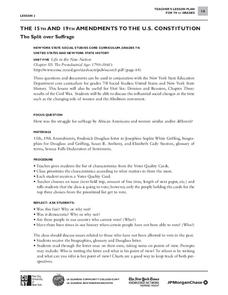Nemours KidsHealth
Puberty: Grades 6-8
Going through puberty isn't easy, or for the faint of heart. Prepare middle schoolers for the challenges of the changes with activities that ask them to assume the role of a reporter for the Human Body Olympics. Writers craft a news...
Curated OER
The Effect of Math Anxiety on Cardiovascular Homeostasis
Using a pulse monitor, learners will measure a resting pulse, take a math test, and then measure the pulse again. They analyze the change in pulse and compare it to performance on the test. This multi-purpose lesson can be used in a...
Curated OER
Immune System
Defense mechanisms, the lymphatic system, antibodies, and allergy are all topics addressed in this immunity activity. Although designed as a chapter review for a specific text, it can be used as a unit review for any class in which you...
Curated OER
AP: Chapter 44: Regulation of the Internal Environment
When nature calls, you need to answer. Physiology learners discover that it is a just your body's way of regulating pressure and water content. Along with osmoregulation, they also examine thermoregulation, two vital processes with which...
Curated OER
Regulating the Internal Environment
This presentation begins with the many problems multicellular organisms which rely on diffusion encounter. There are many diagrams of mammalian organ structures, and they are labelled with their relevant functions. This an excellent...
Curated OER
Circulatory System
Don't let the first slide and its blurry picture detract you from the value of this PowerPoint. Yes, it needs new graphics, but the organization flows like blood, and it succinctly covers the structure and function of the circulatory...
Gallantsbiocorner.com
Heart and Circulation
Young scientists get to the heart of the matter with this comprehensive review of the circulatory system. Addressing the different anatomical structures and processes involved in pumping blood through the human body, this worksheet...
City University of New York
The 15th and 19th Amendments to the U.S. Constitution
Who gets to vote? Learn more about struggles for suffrage throughout United States history with a lesson based on primary source documents. Middle schoolers debate the importance of women's suffrage and African American...
NOAA
Deep-Sea Corals
Come take a peak at the corals in the deep. Science scholars discover the hidden world of deep-sea corals in the third installment of a 13-part series. Topics include the differences between shallow water and deep-sea corals, the...
NOAA
Deep-Sea Benthos
Much like a distant planet, the underwater world of deep-sea benthos is strange and largely unknown. How do creatures survive and thrive in such extreme pressure and temperature conditions? Young oceanographers join the crew of Operation...
Concord Consortium
Full of Beans
Scholars have an opportunity to use their geometric modeling skills. Pupils determine a reasonable estimate of the number of string beans that would fill the average human body.
University of Arkansas
Promises Denied
"Promises Denied," the second instructional activity in a unit that asks learners to consider the responsibilities individuals have to uphold human rights, looks at documents that illustrate the difficulty the US has had trying to live...
Baylor College
It Begins with the Heart
Aspiring anatomists label a photograph of a human heart by comparing it to a colored diagram on the same page. The video that is mentioned in the procedure does not seem to be available, but the overview provides plentiful background...
Baylor College
The Heart is a Pump
Circulate this news: the heart is a pump containing one-way valves! Following the previous lesson on the external structure of the heart, learners now take a look at the inside. They use a three-color diagram to label a black-and-white...
Howard Hughes Medical Institute
Lesson 2: Gorongosa National Park
How has Gorongosa National Park changed over time? Discover the park's rich history, dating back to primitive human times, through an interactive timeline and scientific reading. The second installment in an eight-part series explores...
National Constitution Center
Civil Liberties and Rights Worldwide
How do governments differ in how they protect human rights? While the United States prides itself on its Bill of Rights, other countries have their own ways of protecting citizens' liberties. An interactive website, paired with...
College Board
2002 AP® Human Geography Free-Response Questions
Nations and states may sound like similar ideas, but these concepts have led to endless wars and conflicts. Learners explore the terms using authentic College Board materials. An additional test item delves into the influence of...
College Board
2000 AP® Environmental Science Free-Response Questions
Practice makes perfect! A released AP® exam gives scholars practice with the high level of expectations of their exams. The exam consists of four questions from 2000. Questions ask about endangered species, recycling, alternative fuels,...
College Board
2003 AP® Environmental Science Free-Response Questions
One size fits all doesn't seem to be the right approach to endangered species. Using a four-part AP® assessment, learners respond to questions that address environmental concerns such as human population changes, invasive species...
College Board
2001 AP® Human Geography Free-Response Questions
The green revolution has changed agricultural practices, but its success may be limited. Learners consider why as they use authentic College Board materials. Other prompts explore the rise of suburbs and the stages of economic development.
Facing History and Ourselves
Standing Up to Hatred on Cable Street
The final lessons in this section of the Standing Up for Democracy unit ask class members to consider ways they can help create a "more humane, fair, and compassionate environment" in their communities. For context, learners study how...
NASA
Wetlands
Take a little wade in the wetlands. A fun unit has pupils conduct a literature review to learn how climate change and human actions affect wetland ecosystems. They take a trip to a wetland, observe the fauna and flora, and then take and...
Curated OER
We've Come a Long Way, Baby!
Students study technology and the different reproductive technologies available today. In this human reproductive technology lesson students describe how engineers create technologies to improve the health of mothers and babies.
Curated OER
The Man Who Mistook His Wife for a Hat
Four scenarios of unusual human behaviors are given to your psychology class. Based on their knowledge of brain anatomy and function, they consider what parts of the brain might be affected in order to result in the behaviors. This case...
Other popular searches
- Arts and Humanities
- Humanities and Music
- Humanities and Culture
- Art and Humanities
- Integrated Humanities
- What Are the Humanities
- Humanities Ancient Greece
- Humanities Africa
- Arts Humanities
- Arts; Humanities
- Primary Humanities
- Humanities Morality Plays























